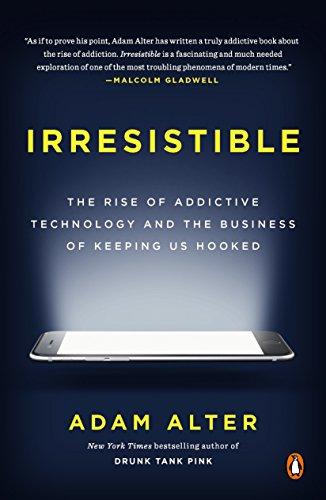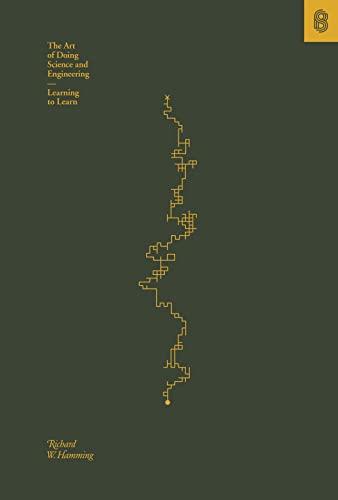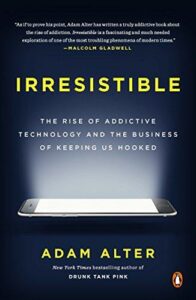As the sun rises on another day, the world of technology continues to innovate, amaze, and ultimately transform our everyday lives in a multitude of intricate ways. It buzzes, it beeps, it streams, it connects – it’s an ever-evolving frontier of human ingenuity. Welcome to our blog post where we cross this digital Rubicon, illuminating corners of this tech wonderland. Whether you’re a sage of Silicon Valley, a ROY (rookie of the year) coder, or simply an aficionado of all things gadgetry, this post will take you on a grand tour of some truly spectacular technological marvels. So buckle up, power up, and let’s set off on this electrifying journey into the vibrant world of tech products.
Table of Contents
- Irresistible: The Rise of Addictive Technology and the Business of Keeping Us Hooked
- The Art of Doing Science and Engineering: Learning to Learn
- Q&A
- Seize the Opportunity
Irresistible: The Rise of Addictive Technology and the Business of Keeping Us Hooked

This eye-opening book, printed in English, offers a deep-dive into the addictive nature of modern technology. With a substantial length of 368 pages, there is a lot of content to absorb, which will keep readers engaged for many hours. Edward Tufte didn’t write this book lightly on buffer paper; it weighs about 11.2 ounces. Its dimensions of 5.45 x 0.81 x 8.3 inches make it comfortably portable, allowing you to carry it around easily. Published by the prestigious Penguin Books, this paperback offers great value with its compelling and thought-provoking content.
Nonetheless, like any product, it has its own set of pros and cons.
- Pros:
- Rich in content, with detailed analysis of the rise of addictive technology
- Robust physical quality
- Portable, making it a perfect companion for travel
- Published by a recognized publisher, adding to its credibility
- Cons:
- Could be a bit heavy for some, given its weight of 11.2 ounces
- Some may find the writing style slightly academic and complex
The Art of Doing Science and Engineering: Learning to Learn

Highlights of the Product:
- A new edition features over 70 redrawn graphs and charts, improving visualization and comprehension of key concepts.
- Written by Richard W. Hamming, a renowned and esteemed scientist and mathematician, best known for his groundbreaking work in error correction formulas.
- Published by Stripe Press, recognized for its focus on economic and technological advancement. This adds a level of credibility and relevance to the content.
- The work is a study guide on how to think like a great scientist, using real-world examples such as “Digital Filters” and “Error-Correcting Codes”.
Pros and Cons:
- Pros: The book provides actionable advice on pursuing excellence in scientific work. It’s a great tool for anyone—students, researchers, or lovers of science—interested in learning about scientific thinking. The author’s personal stories provide insight and inspiration for readers aspiring toward extraordinary work. The book’s premise promises to prepare the next generation for even greater achievements.
- Cons: Some readers might find the content challenging if they’re not familiar with topics such as digital filters and error-correcting codes. As the book is a parody of a textbook, some might expect it to teach these subjects specifically, which it does not. Instead, it uses these subjects as a means to teach scientific thinking.
Q&A
Q: Can you briefly describe what ”Irresistible: The Rise of Addictive Technology and the Business of Keeping Us Hooked” is about?
A: This book delves into the intriguing and, at times, sinister ways in which technology has been developed to be compelling, keeping us constantly engaged. It’s an in-depth examination of the cycle that the tech industry – from game designers to social media gurus – uses to ensure we remain tethered to our devices.
Q: How does this book relate to tech triumphs?
A: While it may sound ominous, it’s all about understanding and appreciating the psychological acuity and cleverness applied in developing these technologies. Such advancements have generated tremendous financial success and ubiquitous adoption, by creating connections and providing satisfactions that we can’t resist.
Q: How is “The Art of Doing Science and Engineering: Learning to Learn” associated with cutting-edge innovations?
A: This book focuses on the skill sets one might need to succeed in a science or engineering career, in an ever-evolving technological landscape. It recommends ways to be adaptive, forward-thinking, and creative – key features behind every cutting-edge innovation.
Q: What are some of the key takeaways from this book?
A: The book offers nuggets of wisdom about learning how to learn, be it grasping new technologies, keeping up with changing trends, or using old tools in new ways. It underlines the necessity of creativity and out-of-the-box thinking that significantly contribute to innovative triumphs in the tech sphere.
Q: How do these two books compare in terms of the perspective offered towards technology?
A: “Irresistible” investigates the impact of the tech industry’s strategies on our lives, suggesting that its triumphs could have a darker side. On the other hand, “The Art of Doing Science and Engineering” provides a roadmap for creating and understanding these innovations, emphasizing the necessity of such approaches in the tech realm. While one presents a critique of particular tech practices, the other offers the tools to navigate and potentially improve these practices.
Q: Who would benefit from these books?
A: Anyone interested in the intersection of technology, psychology and business might find “Irresistible” fascinating. As for “The Art of Doing Science and Engineering”, it would appeal to those who are interested in the methodologies and mindset behind technological innovations. Both books provide different, but complementary insights into the vast and complex world of technology.
Seize the Opportunity
As we step out from the tapestry of marvels interweaved in this digital age, it becomes increasingly clear that technology has not only rewired our lives but has etched an indelible imprint on our perception of the world. It’s a dual-narrative of addiction and enlightenment, a heady cocktail of irresistible allure and the potential for great advancement. In ‘Irresistible: The Rise of Addictive Technology and the Business of Keeping Us Hooked’, we’ve seen the fascinating and somewhat scary power of technology and its undeniable hold on us. Meanwhile, ‘The Art of Doing Science and Engineering: Learning to Learn’, magnificently juxtaposes this by focusing on how we can embrace technology to foster our learning abilities.
In this round-up, we’ve ventured down the rabbit hole of today’s top tech triumphs. And what a fascinating journey it’s been. The scope is ever-expanding, propelling past boundaries we never even knew existed, yet all the while reminding us that at its core, our co-existence with technology should ideally be one of symbiosis. Let’s continue to be both awed and enlightened, addicted and educated, and continually adapt to this rapidly evolving digital landscape we’ve come to inhabit.
So as we power down this tech round-up, remember, it’s our human ability to learn, adapt and evolve that drives these triumphs in technology. Until the next time we connect, keep exploring, keep innovating, and above all, continue to marvel at the triumphs of technology!

